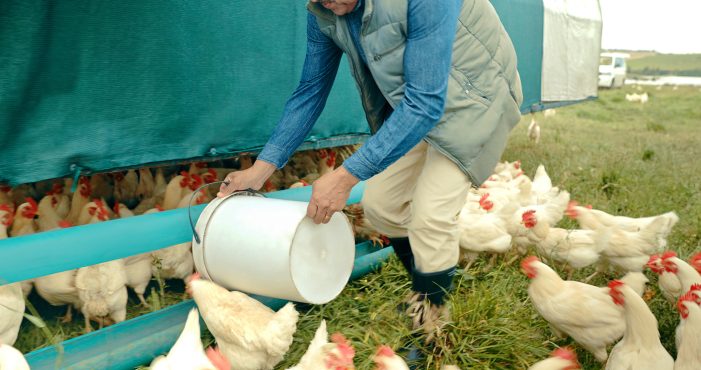U.S. May Vaccinate Poultry in Response to Bird Flu Outbreak

The U.S. government is considering a mass vaccination campaign for commercial poultry as an option to address an outbreak of pathogenic avian influenza (HPAI) H5N1 (bird flu) in the country.1
In February 2022, the U.S. Department of Agriculture’s (USDA) Animal and Plant Health Inspection Service (APHIS) announced an H5N1 virus outbreak in a commercial turkey facility in Dubois County, Indiana, which was followed by outbreaks in three other commercial poultry facilities and a backyard flock. This was the first confirmed case of the H5N1 virus in commercial poultry in the United States since 2020.2
According to APHIS, this is the biggest H5N1 outbreak in history in the U.S., affecting more than 58 million farmed birds in 47 states. The outbreak has caused the deaths of millions of chickens, resulting in price of eggs to increase.3
A spokesperson for the White House National Security Council said:
There are a range of options the United States regularly considers when there is any outbreak that could affect the security and safety of the United States’ food supply. Right now, we are focused on promoting and enhancing high-impact biosafety practices and procedures.4
Avian Influenza in Birds is Common
Avian influenza A viruses have been found in 100 different species of wild birds around the world. The viruses are naturally found in wild aquatic birds and can infect domestic poultry and other bird and animal species. Wild aquatic birds include water birds such as ducks, geese, swans, gulls, and terns, and shorebirds, such as storks, plovers, and sandpipers. Wild aquatic birds, particularly dabbling ducks, are considered hosts for avian influenza A viruses.
Wild aquatic birds can be infected with avian influenza A viruses in their intestines and respiratory tract but may not necessarily show symptoms. Avian influenza A viruses are very contagious among birds and can kill certain domesticated bird species, such as chickens, ducks and turkeys.5
Birds infected with avian influenza A viruses shed the virus through their saliva, nasal secretions, and feces. Susceptible birds get infected via contact with infected birds and through contaminated surfaces.6
Avian Influenza is Low Risk and Rare in Humans
Avian influenza infections in humans are rare and transmission of the virus between humans is extremely rare.7 According to the U.S. Centers for Disease Control and Prevention (CDC), less than 10 human cases of H5N1 infections have been reported worldwide.8
Cases of avian influenza in humans typically occur when people are exposed to infected poultry. The CDC, in partnership with local public health departments, is monitoring people who are exposed to the H5N1 virus. So far, 6,315 people in the U.S. have been monitored out of which 163 reported symptoms. Only one person has tested positive for the virus so far.9
Concerns About Human Adapted Version of Avian Flu Causing a Pandemic
Health policy professionals have worried that a human adapted version of avian influenza could lead to a global pandemic. Garrett Wilkinson of the international nonprofit public health organization Partners In Health (PIH) in Boston, Massachusetts said:
While it is extremely important that serious efforts are taken to bring the outbreak in domestic and wild birds under control, the reality of the situation is serious enough that we must be taking more steps to prepare for a possible human outbreak of this virus. We should be viewing this as a live-action fire drill.”10
A report released by PIH stated:
We evaluated the policy response o H5N1in the U.S. and have identified potential gaps in A (H5N1) pandemic preparedness. While non-exhaustive, this analysis identifies important gaps and describes steps that need to be taken to ensure that vaccine-based countermeasures are available in the event they are needed.11
Avian Influenza Vaccines Being Tested
Currently, a vaccine for a highly infectious avian influenza strain like H5N1 has not been approved for administration to chickens and turkeys in the U.S. Officials at the USDA say that there are several licensed poultry vaccines but it is not known whether they are effective against the current strain.12
Dr. Erica Spackman, a microbiologist at USDA’s Agricultural Research Service, who is the lead scientist in the testing of the poultry vaccines, said they have been working to develop vaccine candidates internally but are also testing vaccines that are already licensed for chickens, turkeys and domestic ducks. If any of the licensed vaccines are found to be effective, there is a possibility that they could be approved for use faster than new vaccine candidates. The approval time for animal vaccines is usually three years; however, that time period can be altered in emergency cases.13
Farm birds already receive vaccines for infectious poultry diseases such as fowlpox. However, there is concern that an avian influenza vaccination program would complicate issues relating to trade restrictions that could potentially jeopardize the $6 billion poultry export industry. Dr. Carol Cardona, who is an expert on avian health at the University of Minnesota, said that the fear of trade bans on H5N1 vaccinated poultry is a huge obstacle to the mass vaccination program.14
If you would like to receive an e-mail notice of the most recent articles published in The Vaccine Reaction each week, click here.
Click here to view References:
No comments:
Post a Comment